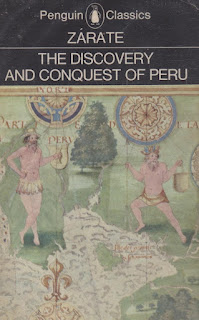 Scipio: A Novel by Ross Leckie
Scipio: A Novel by Ross LeckieMy rating: 3 of 5 stars
I often wonder what is it about the Roman Republic that is so attractive that I keep coming back to it. Its probably that this is the first of the many experiments in Republicanism which has left extensive records from the times of its birth till the fall. Probably, the next one that comes close to it is the French republic (Numbers 1 till 4) that comes in the Eighteenth century.
More than anything, it is that the history of the Roman republic repeats itself over the past thousands of years - in the words of Marx "first as tragedy and then as a farce". It is incredible that so much of what has happened 2000 years back keep repeating itself - only with different actors. However, that is for another day.
I picked up "Scipio" in a used book shop. I couldn't resist the fact that the book is about the period when the Republic was at its zenith and that it is the story of that irresistible military genius Scipio Africanus. There is just not enough books about him.
The book is a fictional account of the life of Scipio from about the time Hannibal starts his invasion of Italy till he is beaten decisively by Scipio at the Battle of Zama. However, the book focuses more on Scipio - the man than the famed Scipio Africanus.
The tomb of Scipio's is something I've read about and have always wondered about the family which called itself the 'Staff of Rome' and the role they had in the continuance of the Republic. Scipio Africanus - hailing from that family which has served Rome already for more than 300 years and the most famous of Scipio's - juxtaposes his life with the other most famous general of his age - Hannibal Barca.
The book is part of a trilogy but the book can be read independently without worrying about the backstory. While the book covers a lot of history - from the times of Scipio A's father - it also glosses over a lot of details and misses out on a lot of personal narrative of Scipio.
The book feels incomplete because of this - there is no reference to the marriage of Scipio for example. How can such a thing be completely skipped over is beyond me. In fact, Scipio marries the daughter of Paullus who dies at the Cannae. While the lost battle - Hannibal's biggest victory in Italy - is described in some detail, the aftermath is covered with haste.
That is not what makes the book bad though. It is the fact that it does not do justice to Scipio - either as a history or as a fictional account - is what does it. I kept waiting for something interesting to happen - till the book ended. A lot of war and atrocities happen and explained in detail as well but there is a lack of substance in all that which stops you from caring for anyone in the story - including Scipio.
Cato comes out as a bad villain and has no role to play other than showing up in letters and as some bad guy whose intentions remain unclear till the end. While the history explains it for those interested in it, there is no clarity for those reading it as fiction.
When I started, I was thinking of reading the trilogy in complete but am not sure now. I might still read the first one 'Hannibal' - just because of the fact that he has always fascinated me. However, I am more inclined to read the real history and be done with it.

No comments:
Post a Comment